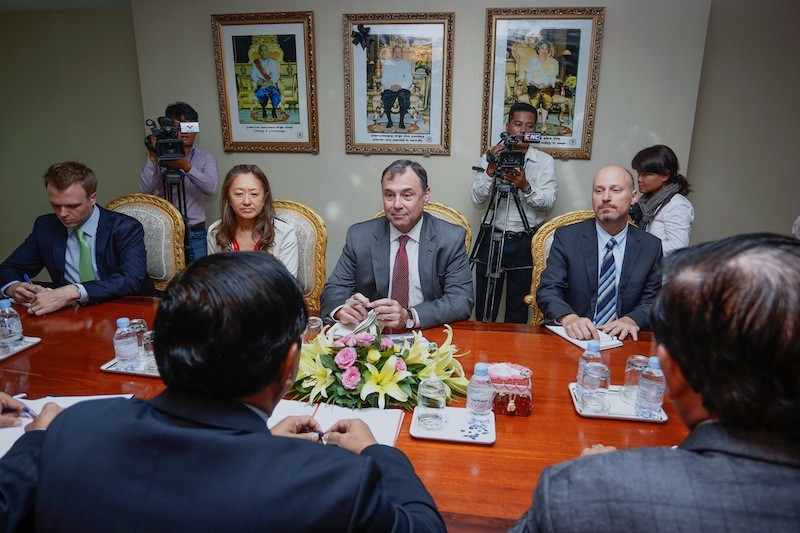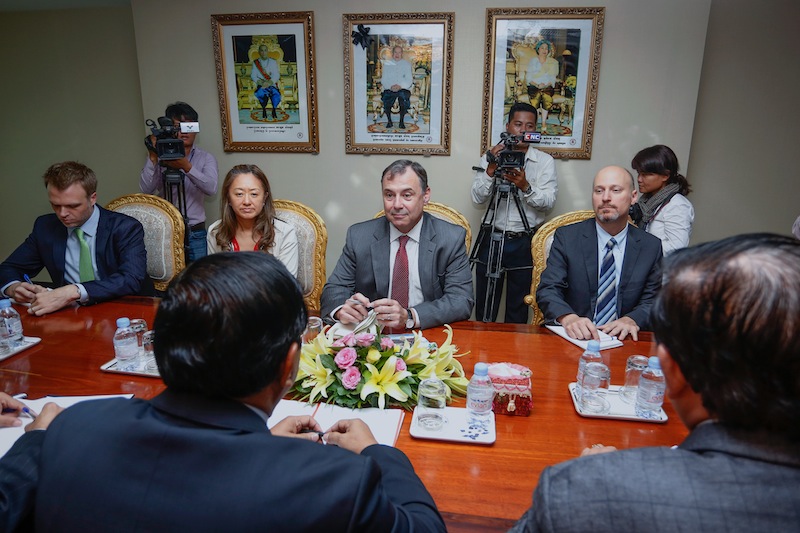The U.S. ambassador said on Friday that Cambodia was in a league with only three other countries—Sudan, Somalia and Zimbabwe—in being in arrears to the U.S., and said the government should stop dwelling on the past and start planning how to pay back a loan from the 1970s now worth $500 million.
“I am not sure that’s a group that it’s in Cambodia’s interest to be a member of,” U.S. Ambassador William Heidt said of countries in arrears to the U.S., speaking to journalists from Khmer-language media outlets at the U.S. Embassy on Friday, in a recording obtained by The Cambodia Daily.

“Until it takes care of its debt with America and its other creditors, it cannot have a normal relationship with the IMF” or take advantage of other opportunities to borrow money from the international markets, he said.
Mr. Heidt also spoke critically of Cambodia canceling military exercises with the U.S. and of Prime Minister Hun Sen proposing legislation that would sideline the main opposition party. “I don’t think that’s what the Cambodian people want.”
Since the election of U.S. President Donald Trump, Mr. Hun Sen has publicly lobbied the U.S. to cancel the debt, which started as a $274 million loan mostly for food supplies to the Lon Nol government, but has almost doubled as Cambodia has refused to hash out a repayment plan.
Mr. Heidt said that as an economic officer at the U.S. Embassy in the late 1990s, he had been part of an effort to hammer out a deal that would have allowed Cambodia to pay back the loan over 40 years and with no interest for 16 years.
“The number we were talking about back then was less than $200 million. So now, 19 years later, I come back; the issues remain unsolved; and that number has grown to $500 million, about. So to me, I think that is unfortunate, I think that’s not in Cambodia’s best interest to keep letting that grow forever,” he said.
“To me, Cambodia does not look like a country that should be in arrears. Buildings coming up all over the city, foreign investment coming in, government revenue is rising rapidly,” Mr. Heidt added.
The ambassador said that dwelling on the history of the debt—delivered during a time when the U.S. was carpet-bombing parts of Cambodia along the Vietnamese border—would not be fruitful.
“I’m saying it’s in Cambodia’s interest not to look at the past, but to look at how to solve this because it’s important to Cambodia’s future,” he said, adding that the U.S. had never seriously considered canceling the debt.
“I will say that the issue of cancellation…that wasn’t on the table when I was here in the 1990s. It has never been on the table since then. So we have never discussed seriously or considered canceling that debt with Cambodia,” he said.
“Now, working out a deal that works for both sides—that we’re happy to do at any time.”
During the 40-minute meeting, Mr. Heidt also said that he was “disappointed” by Cambodia’s decision last month to cancel military training exercises, though he noted that it was a missed opportunity to learn from the most skilled soldiers in the world.
“So to me it was disappointing, but I do think at the end of the day it is the Cambodian people and the Cambodian military who pay the price for that decision, not really the United States.”
He also said that new threats by the ruling party to amend the Law on Political Parties in a way that would likely sideline opposition leader Sam Rainsy and perhaps dissolve the CNRP were moves in the wrong direction.
“At the end of the day, reconciliation is letting various political forces operate inside Cambodia. And things like that, throwing people out of the game, removing parties…I don’t think that’s what the Cambodian people want and I don’t think that helps Cambodian democracy develop,” he said.
CPP spokesman Sok Eysan said he was not pleased by Mr. Heidt’s remarks.
“His speech is a strong, powerful speech—like his country is bragging that it is the most powerful country in the world,” Mr. Eysan said.
In what has become a common refrain from the CPP, he said the loan was symbolic of the U.S.’s bombing campaign in Cambodia from the mid-1960s to mid-1970s, and mostly contributed to bloodshed in the country.
“In my opinion, they should eliminate it because that money was not taken to develop the country, but was borrowed to fight against the competitors—to buy the bombs and drop them to kill tens of thousands people and destroy properties and infrastructure,” he said.
“You destroyed us and demand us to pay the debt.”
With the CPP making a public issue of the debt in the hope of catching the attention of the new U.S. administration, Song Chhang, an information minister under Lon Nol who now lives in California, weighed in with a post on Facebook on Sunday.
“I am afraid that negotiation with the Trump administration is going to be tough. Besides, there are too many ways Cambodia can go wrong. It was Lon Nol’s Cambodia who contracted that debt and which lost the war to the communist Khmer Rouge. President Trump does not like losers,” he wrote.
“He likes to make deals. But Cambodia hardly has anything to use in the deals—no petroleum pipeline, no automobile industry, no steel mine, no missile launching pad to trade with Trump in the deal, except perhaps a tariff on every shirt and every pair of jeans Cambodia exports to the US. That can help when handled by skillful negotiators.”




